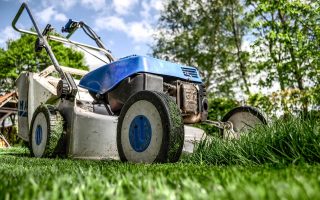
With summer nearly here, it’s the time of the year when most of us will have to spend the most time mowing and taking care of our lawns. Between keeping grass under control, eliminating weeds and limiting the amount of dust created by dry patches, proper lawn care can be a surprisingly large component of maintaining a healthy and allergen-free environment. Here are a few simple tips that anyone can implement to improve their lawn care regimen to reduce allergy and asthma symptoms.
1. Hire Out Your Lawn Care
Though it may not be economically practical for everyone, hiring out your lawn care can be massively helpful for those suffering from the most severe allergies and asthma. Mowing your lawn, in particular, can aggravate respiratory conditions, as it is both physically exerting and fills the air around you with potential irritants. Finding someone willing to mow and trim your lawn for a reasonable price can save you from having to expose yourself to these conditions.
2. Treat Your Lawn for Weeds
Though grasses can irritate your allergies and certainly do contribute to asthma, most airborne pollen is produced by various weeds. This means that if your lawn is mostly free of weeds, you are less likely to be exposed to high levels of pollen at home. Several great lawn care products are currently on the market that can remove most weeds from your lawn with occasional application, so achieving a weed-free lawn does not require constant weed pulling.
3. Water Frequently With Evenly-Spaced Sprinklers
Since healthy, growing plants are the producers of pollen, it may seem counter-intuitive to provide them with extra water. However, doing so has some definite benefits. Firstly, keeping your lawn adequately hydrated will keep the ground from drying up and becoming airborne as dust, which can be just as harmful as pollen in large quantities. Secondly, once you have eliminated pollen-producing weeds from your lawn, keeping your grass healthy will make it more difficult for them to get a foothold again. Lastly, watering your lawn can be a surprisingly effective hack for allowing you to enjoy your outdoor spaces in peak pollen season without suffering severe allergy symptoms. Because pollen is made up of tiny particles, water on the plants that produce it will temporarily prevent it from becoming airborne by weighing it down. If you want to spend some relaxing time outside but can’t stand the idea of becoming congested because of your pollen allergies, consider sitting outside while your sprinklers are on.
4. Establish a Good Routine After Lawn Care
If you can’t or simply don’t want to hire out your lawn care to someone else, it’s important to go through a proper routine after finishing your yard work to make sure you won’t carry pollen around with you for the rest of the day. This routine should include showering and changing clothes as soon as possible, as your clothes, skin and hair can all carry pollen. If you are very sensitive to pollen, it may also be a good idea to keep an old, worn-out pair of shoes around specifically for yard work so that you can wear something else for your day-to-day activities.
When coming inside from your days of yard work, it is also important to make sure that the air you are breathing in your home is pollen free, as ambient pollen in the air can keep your allergic reaction going longer than it otherwise would. To make sure that your air is completely clean and healthy, it’s important to make use of a high-quality HEPA air purifier. You can check out US Air Purifiers’ selection of residential units here to find the best purification system to meet your needs. Not sure what you’re looking for? Don’t worry, we’re here to help. Feel free to contact us with your questions, and we’ll help to guide you through the process of picking out the ideal air purifier based on your needs and environment.